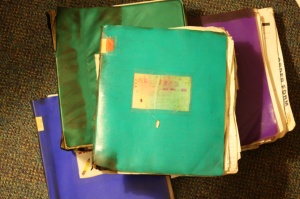Japan, 1912-1949
Christian W. Chandler :
4/5/
5/4/99
English, 1
On my honer, I, Christian Weston Chandler, pledge
that this paper reflects my own thoughts.
Any sources used to support my ideas
have been properly documented.
Very confusing + unclear.
Christian W. Chandler
5/4/99
English, 1
Japan, 1912-1949.
This essay is about the second World
War, where the US went against Germany
and Japan. The war was a very tragic
event with guns, insults, and... yuck! Now
we will see how Japan was involved, how
the past before it affected it, and how the war
was started.
Like all fights, the war did not start big, but,
"Just a litt [Chris almost forgot to skip a line, but corrected himself]
"Just a little skirmish between Japanese troops
on night maneuvers and Chinese troops guarding
the Marco Polo bridge." (Going to war with Japan, P.3). So the war was started only
because of privacy invasion for U.S. But, even
before that "skirmish," "The Japanese and Americans
had been glowering at each other like boxers from... →
P.2
...opposite corners of a 5,000-mile ring, waiting
for their bout to begin." (War Against Japan,
P.7). So, US and Japan really wanted to
get it on.
During the wait for the start of the war,
the Japanese were, "Cloistered on their remote islands,
with little contact beyond the sea, they deemed
themselves as a superior race and the rest of the
world as barbarians." (War Against Japan, P.8).
But [illegible] But the real "barbarians," were the
Japanese themselves. The US thought the same
way, and, "When Japan marched into Manchuria in
1931, the US denounce the action and said they
would never recognize Japan's conquest." (Going to war with Japan, P.4). Right then, the
US wanted to prove themselves more superior. →
P.3.
As the war went on, both sides saw
that it was unwinnable. "Wartime in Japan was
viewed as sinister.",and fanatical soldiers [illegible] (Forum).
At near the end of the war, "President Woodrow
Wilson tried to get Japan to withdraw from Shandong."
(Going to War with Japan,) P.4). Even the President
of US tried to put and an end to the nasty
war.
SoAnd so, after the war finally ended,
US and Japan came into peace, and somemost people from both sides were happy. Now we saw how the war started, and how much Japan was involved.
Ricardo W. Chandler.
5/5/99
Inglés, 1
Trabajas "Cited."
Moody, Jr., Sidney C., War Against Japan.
→ Novato, CA. Peridio Press. © 1994.
Utley, Jonathan G., Going to War with Japan.
→ Knoxville. University of Tennesee Press. © 1985.
"Tojo Hideki." World War II Commemoration.
→ http://WWW.grolies.com/wwii/wwii_tojo.html
"At 50 years end: The Legacy of War in J Germany
→ and Japan." Forum.
→ http://www.smn.co.jp/forum/0068f01e.html.
Incorrect format
Ricardo (Christian) W. Chandler.
5/5/99
Ingles, 1.
Japan, 1912-1949: P.1.
This essay is about [teacher circled this and wrote "weak" in margin] the second World War, where the USA
went against Germany and Japan. The war was a very tragic
event with guns, insults, and...yuck! [teacher wrote a "no" sign over this and wrote "no slang" in margin] Now, we [teacher circled this and wrote "3rd person" in margin] will see how
Japan was involved, how the past before it affected it, and how the war was started.
Like all fights, the war did not start big, but, "Just
a little skirmish between Japanese troops on night maneuvers
and Chinese troops guarding the Marco Polo Bridge." (Going to War with Japan, P.3). [Teacher struck through this and wrote "Author" above it] So, the war was started only because the privacy of US was invaded. But, even before
that "skirmish," "The Japanese and Americans had deem [teacher circled this word]
glowering at each other like boxers from opposite corners of
a 5,000-mile ring, waiting for their bout to begin." (War Against Japan, P.7). [teacher wrote "Author" above this as well] So, the US and Japan really wanted to
get it on.
During the wait for the start of the war, the Japanese
were, "Cloistered on their remote islands, with little
contact beyond the sea, they deemed themselves as a superior
race and the rest of the world as barbarians." (War Against Japan, P.8). [teacher wrote "Author" above this as well] But the real "barbarians," were the Japanese people themselves. The US thought the same way, and, "When
Japan marched into Manchuria in 1931, the US denounced the actions, and said they would never recognize Japan's
conquest." (Going to war with Japan, P.4). [teacher wrote "Author" above this as well] Then, the US wanted to prove themselves more superior.
P.2.
As the war went on, both sides saw that it was
unwinnable. "Wartime in Japan was viewed as sinister."
(Forum). At near the end of the war, "President Woodrow Wilson tried to get Japan to withdraw from Shandong."
(Going to War with Japan, P.4). Even the President of the
US wanted to put an end to this nasty war.
[teacher wrote "Restate Thesis" in margin] And so, after the war finally ended, the US and Japan
agreed to peace, and most people from both sides were happy.
Now, we saw how the war was started, how the past before it
affected it, and how much Japan was involved.
|












































